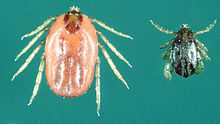Rhipicephalus microplus
| Rhipicephalus microplus | |
|---|---|
 | |
| female and male | |
| Scientific classification | |
| Kingdom: | Animalia |
| Phylum: | Arthropoda |
| Class: | Arachnida |
| Order: | Ixodida |
| Family: | Ixodidae |
| Genus: | Rhipicephalus |
| Subgenus: | Boophilus |
| Species: | R. microplus |
| Binomial name | |
| Rhipicephalus microplus (Canestrini, 1888) | |
| Synonyms | |
|
Boophilus microplus | |
Rhipicephalus microplus (formerly Boophilus microplus) is an economically important tick that parasitises a variety of livestock species; it is known as the cattle tick or southern cattle tick.[1] It has been recorded on "cattle, buffalo, horses, donkeys, goats, sheep, deer, pigs, dogs and some wild animals".[1] It is found in Asia, parts of Australia, on Madagascar, in southeastern Africa, in the Caribbean, South and Central America and Mexico. Having formerly been present in the United States, it has since been eradicated there, except for sporadic occurrences in a buffer zone along the Mexican border.[1]
In Louisiana, Governor Ruffin Pleasant in 1917 signed legislation sponsored by freshman State Senator Norris C. Williamson of East Carroll Parish to authorize state funding to eradicate the cattle tick.[2]
See also
References
- ↑ 1.0 1.1 1.2 "Rhipicephalus (Boophilus) microplus. Southern Cattle Tick, Cattle Tick" (PDF). Iowa State University. February 20, 2007. Retrieved November 7, 2010.
- ↑ Journal of the American Veterinary Medical Association, April 1918, p. 639. Ithaca, New York: American Veterinary Medical Association, 1918. Retrieved July 25, 2013.